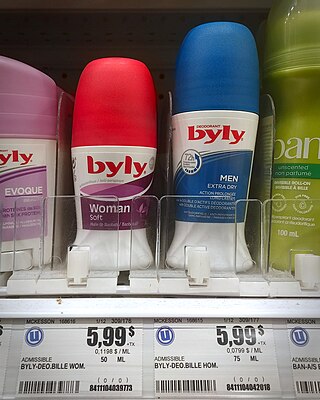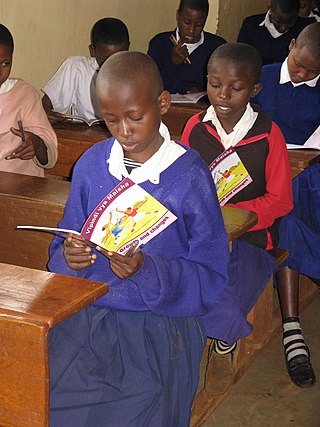Related Research Articles

A tampon is a menstrual product designed to absorb blood and vaginal secretions by insertion into the vagina during menstruation. Unlike a pad, it is placed internally, inside of the vaginal canal. Once inserted correctly, a tampon is held in place by the vagina and expands as it soaks up menstrual blood. However, in addition to menstrual blood, the tampon also absorbs the vagina's natural lubrication and bacteria, which can change the normal pH, increasing the risk of infections from the bacterium Staphylococcus aureus, which can lead to toxic shock syndrome (TSS). TSS is a rare but life-threatening infection that requires immediate medical attention.

Toxic shock syndrome (TSS) is a condition caused by bacterial toxins. Symptoms may include fever, rash, skin peeling, and low blood pressure. There may also be symptoms related to the specific underlying infection such as mastitis, osteomyelitis, necrotising fasciitis, or pneumonia.

A menstrual cup is a menstrual hygiene device which is inserted into the vagina during menstruation. Its purpose is to collect menstrual fluid. Menstrual cups are made of elastomers. A properly fitting menstrual cup seals against the vaginal walls, so tilting and inverting the body will not cause it to leak. It is impermeable and collects menstrual fluid, unlike tampons and menstrual pads, which absorb it.

A menstrual pad, or simply a pad, is an absorbent item worn in the underwear when menstruating, bleeding after giving birth, recovering from gynecologic surgery, experiencing a miscarriage or abortion, or in any other situation where it is necessary to absorb a flow of blood from the vagina. A menstrual pad is a type of menstrual hygiene product that is worn externally, unlike tampons and menstrual cups, which are worn inside the vagina. Pads are generally changed by being stripped off the pants and panties, taking out the old pad, sticking the new one on the inside of the panties and pulling them back on. Pads are recommended to be changed every 3–4 hours to avoid certain bacteria that can fester in blood; this time also may differ depending on the kind worn, flow, and the time it is worn.

Feminine hygiene products are personal care products used during menstruation, vaginal discharge, and other bodily functions related to the vulva and vagina. Products that are used during menstruation may also be called menstrual hygiene products, including menstrual pads, tampons, pantyliners, menstrual cups, menstrual sponges and period panties. Feminine hygiene products also include products meant to cleanse the vulva or vagina, such as douches, feminine wipes, and soap.
Rely was a brand of superabsorbent tampons made by Procter & Gamble starting in 1975. The brand's advertising slogan was "It even absorbs the worry!", and claimed it could hold up longer than the leading tampon, because it was made differently. "Remember, They named it Rely" was the last line of most commercials.

Cloth menstrual pads are cloth pads worn in the underwear to collect menstrual fluid. They are a type of reusable menstrual hygiene product, and are an alternative to sanitary napkins or to menstrual cups. Because they can be reused, they are generally less expensive than disposable pads over time, and reduce the amount of waste produced.

There are many cultural aspects surrounding how societies view menstruation. Different cultures view menstruation in different ways. The basis of many conduct norms and communication about menstruation in western industrial societies is the belief that menstruation should remain hidden. By contrast, in some indigenous hunter-gatherer societies, menstrual observances are viewed in a positive light, without any connotation of uncleanness. In most of India, menarche is celebrated as a right of passage.

The Story of Menstruation is a 1946 American animated short film produced by Walt Disney Productions. It was commissioned by the International Cello-Cotton Company and was shown in a non-theatrical release to approximately 105 million American students in health education classes. In 2015, the United States Library of Congress selected the film for preservation in the National Film Registry, finding it "culturally, historically, or aesthetically significant".
Judith Esser-Mittag, commonly known as Judith Esser, was a German gynecologist. Her extensive studies of the female anatomy helped her to create an environmentally friendly tampon with no applicator.
Leona W. Chalmers (1900s-) was an American actress and writer who invented the first usable and available modern menstrual cup. She was also an actress and author who wrote the book The Intimate Side of a Woman’s Life.
Menstrual Hygiene Day is an annual awareness day on May 28 to highlight the importance of good menstrual hygiene management (MHM) at a global level. It was initiated by the German-based NGO WASH United in 2013 and observed for the first time in 2014.

Tampon tax is a popular term used to call attention to tampons, and other feminine hygiene products, being subject to value-added tax (VAT) or sales tax, unlike the tax exemption status granted to other products considered basic necessities. Proponents of tax exemption argue that tampons, sanitary napkins, menstrual cups and comparable products constitute basic, unavoidable necessities for women, and any additional taxes constitute a pink tax.

The pink tax refers to the tendency for products marketed specifically toward women to be more expensive than those marketed toward men. This phenomenon is often attributed to gender-based price discrimination, however research shows that the primary cause is women sorting into goods with higher marginal costs. The name stems from the observation that many of the affected products are pink.

Toxic Shock: A Social History is a book about the evolution of pads and tampons, as well as the toxic shock syndrome, written by historian Sharra Louise Vostral and published by New York University Press on 27 November 2018.

Menstrual hygiene management (MHM) or menstrual health and hygiene (MHH) refers to access to menstrual hygiene products to absorb or collect the flow of blood during menstruation, privacy to change the materials, and access to facilities to dispose of used menstrual management materials. It can also include the "broader systemic factors that link menstruation with health, well-being, gender equality, education, equity, empowerment, and rights". Menstrual hygiene management can be particularly challenging for girls and women in developing countries, where clean water and toilet facilities are often inadequate. Menstrual waste is largely ignored in schools in developing countries, despite it being a significant problem. Menstruation can be a barrier to education for many girls, as a lack of effective sanitary products restricts girls' involvement in educational and social activities.
The Robin Danielson Feminine Hygiene Product Safety Act is a proposed act of the United States Congress, directing the National Institutes of Health (NIH) to research the possible health risks of menstrual hygiene products made with dioxins, synthetic fibers, chemicals such as chlorine or fragrance irritants. It also called for the Food and Drug Administration (FDA) to monitor dioxin levels in similar hygiene products.

Period underwear are absorbent garments designed to be worn during menstruation. Period underwear is designed like conventional underwear but it is made up of highly absorbent fabrics to soak up menstrual blood. Most commercially manufactured period underwear makes use of microfiber polyester fabric. It is recommended that period underwear should be changed every 8-12 hours to avoid leakage and infection.

Period poverty is a term used to describe a lack of access to proper menstrual products and the education needed to use them effectively. In total, there are around 500 million women and girls that cannot manage their periods safely due to lack of menstrual products and for fear of shame. The American Medical Women's Association defines period poverty as "the inadequate access to menstrual hygiene tools and educations, including but not limited to sanitary products, washing facilities, and waste management". The lack of access to menstrual hygiene products can cause physical health problems, such as infections and reproductive tract complications, and can have negative social and psychological consequences, including missed school or work days and stigma.
Natracare is a British feminine hygiene brand that produces organic and plastic-free menstrual products, including tampons, sanitary pads and panty liners.
References
- ↑ "Sharra Vostral". Purdue College of Liberal Arts. 2014-01-06. Archived from the original on 2019-12-31. Retrieved 2020-09-15.
- ↑ "Sharra Vostral, "Testing Tampons: Toxic Shock Syndrome, Feminist Advocates, and Absorbency Standards"". Center for the Study of Women. 2016-06-24. Retrieved 2019-04-23.
- ↑ "Tampon Applicator Invented So We Wouldn't Enjoy Tampons Too Much". The Cut. 10 June 2013. Retrieved 2019-04-23.
- ↑ "Toxic Shock". NYU Press. Retrieved 2019-04-23.
- ↑ Richmond, Vivienne (2013-09-19). Clothing the Poor in Nineteenth-Century England. Cambridge University Press. ISBN 9781107042278.
- ↑ "Why 2015 Was The Year Of The Period, And We Don't Mean Punctuation". NPR.org. Retrieved 23 April 2019.
- ↑ Bobel, Chris; Winkler, Inga T.; Fahs, Breanne; Hasson, Katie Ann; Kissling, Elizabeth Arveda; Roberts, Tomi-Ann, eds. (2020). The Palgrave Handbook of Critical Menstruation Studies. Palgrave Macmillan. ISBN 978-981-15-0613-0.